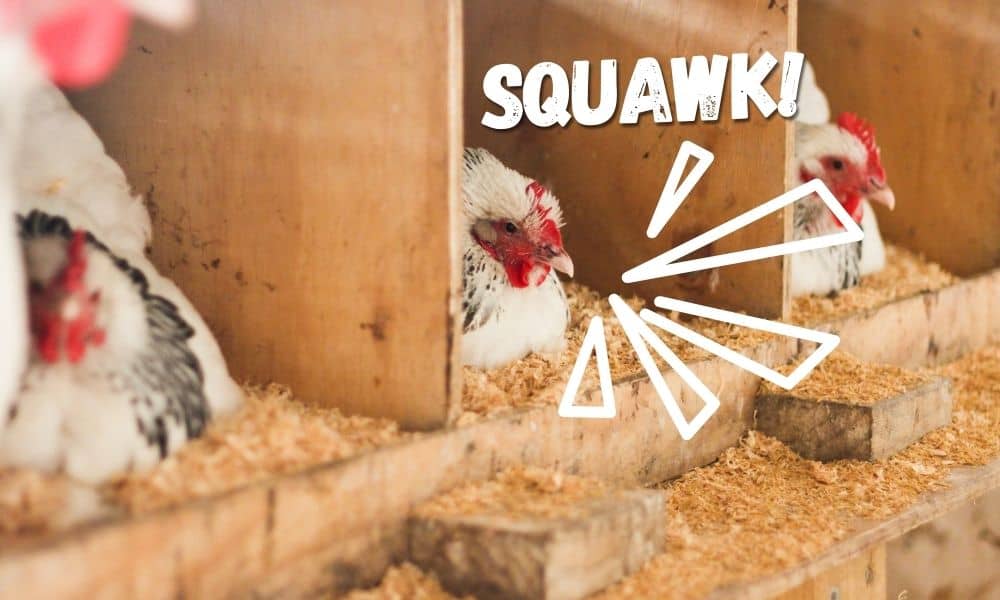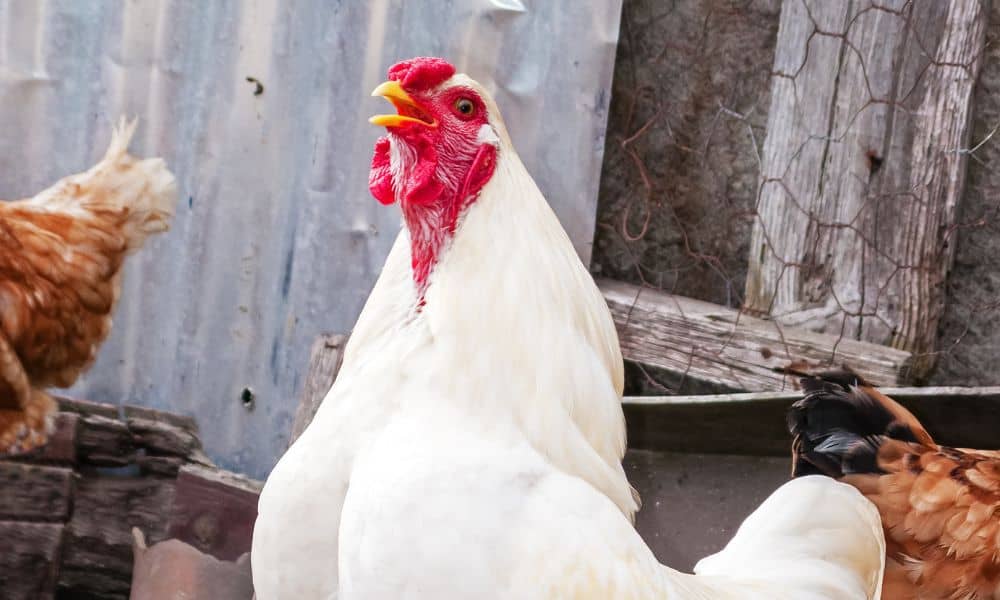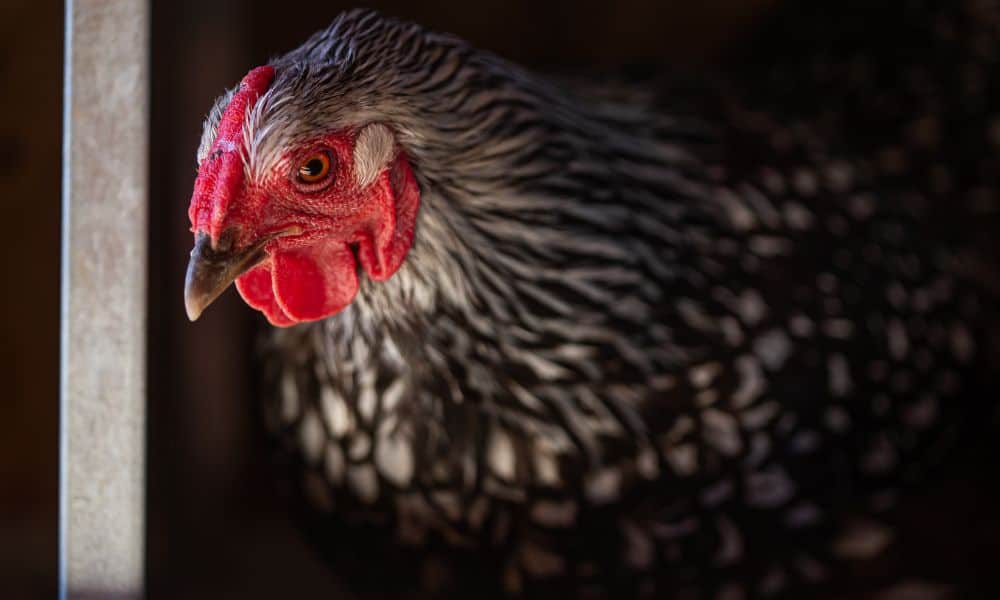It’s true chickens can make over 30 different distinct clucks, trills, growls, and squawks.
But, do chickens actually make a noise as they are literally laying eggs?
Well, they can, but it’s normally only observed in young hens!
However, chickens do make noise before they lay eggs, after they lay eggs, and while they are sitting on their eggs too!
Here are all the sounds chickens will make around the egg-laying process, including the egg song, and the reasons why they do it!
Contents
Do Chickens Make Noise When They Lay Eggs?

It’s true that some hens may wheeze, gasp, or squeak while pushing out an egg. But in reality, it’s not that frequent.
Hen’s will sometimes make these noises as they are laying eggs if:
- They are a younger hen (pullet) laying eggs for the first time.
- They have just returned to laying eggs from an egg-laying hiatus (over winter, or while molting for example).
- They are laying an irregularly shaped egg or a larger egg.
Really, it’s mostly younger hens that will make these noises anyway. The older the hen the easier the process becomes.
Still, just because hens don’t always make noises while they are physically laying eggs, it’s much more common for them to make noise before they lay, after they lay, or while they are brooding over their eggs.
Each stage comes with its very own noises and very different meanings.
Do Chickens Make Noise Before They Lay An Egg?
Anybody who’s owned chickens will attest they can make some rather strange noises.
But, in the context of making noises BEFORE they lay an egg, it’s not too common of an occurrence.
However, when they do make noise before laying eggs, it’s loud, repetitive, and to be frank, quite annoying!
This constant obnoxious clucking noise they do before they lay eggs is said to be the start of the infamous egg chorus or ‘egg song’.
Do Chickens Make Noise After They Have Laid An Egg?

Are you absolutely mystified why your chickens are all squawking loudly, almost in a somewhat rhythmic fashion?
Welcome to the infamous egg chorus or ‘egg song’.
This phenomenon (watch here) has rocked the chicken owners’ community for decades. From commercial farmers, to backyard chicken owners, to animal behavioralists.
The egg chorus normally starts with a single hen. Shortly after they lay an egg they begin a very loud, repetitive squawking or clucking that can go on for up to fifteen to twenty minutes.
This single hen’s squawking can cause a ripple effect amongst your entire flock, and many other chickens will join in and start this same repetitive clucking or squawking behavior.
Although it’s most commonly observed shortly after a hen has laid an egg, it can even be heard about 30 minutes to an hour BEFORE a hen lays an egg too!
Theories On Why Chickens Sing The Egg Song
Although the egg chorus or egg song has baffled backyard chicken enthusiasts, scientists, and animal behaviors alike, there are some common theories that may explain the behavior.
The common consensus is that chickens sing the egg song if they are:
- Alerting their rooster for future breeding and for the protection of their eggs
- They are communicating to their flock that the nesting box is ready
- In its simplest form: celebrating
They Are Alerting Their Rooster
In theory, there are several benefits a hen would get by alerting their rooster to their newly laid egg.
Firstly, consider if the eggs were fertilized. Alerting the flock’s rooster that a new egg has been laid will act as a way to ensure it remains safe.
Secondly, alerting the flock’s rooster will be a way to communicate that the hen is fertile and ready for future mating.
Even if you don’t have a rooster in the flock, your hen’s still bear the same hormones and instincts telling them to sing their song!
Communicating With Their Flock
Similarly to how hens can communicate their newly laid egg to their rooster, there are some clear benefits in hens communicating with each other too.
For one, the loud clucking can be heard all across the property. This signals to other hens that the nesting box is clear and ready for another hen’s use.
That’s why many chicken owners believe the egg song is a way they can communicate with other hens.
They Are Celebrating
Now there’s no denying that laying eggs looks uncomfortable. Especially for young hens who are new to laying eggs.
One quite possible reason that chickens perform the egg song is that they are celebrating a successful egg laying.
Of course, as humans we don’t know exactly how chickens feel about their eggs – so it’s hard to say for sure.
Still, it’s a good theory!
Broody Hens Make Noise While Sitting On Their Eggs

A broody hen laying on their eggs (or even laying on nothing!) will make a rather unique sound, much more unique than the typical clucking and squawking you can observe from chickens before or after they lay eggs.
Instead, a broody hen will make a distinct “purring” or “trilling” sound when we get too close. This is mainly to warn unwanted guests to stay away!
If you’re dealing with a particularly broody hen they may even try to peck you as you go in for the eggs. Luckily, most chickens will still accept you taking their eggs, even after a bit of protest.
Of course, it’s natural for any mother to want to keep their babies safe!
Quieter Chicken Breeds
If you’re looking for some excellent egg layers, but live in a dense urban area or a quiet neighborhood, you can always consider raising the quieter chicken breeds.
Although there are no “silent’ chickens, there are certainly those that are generally much quieter than others, these include:
- Brahmas
- Buff Orpingtons
- Easter Eggers
- Wyandottes
- Bantam chickens, in general – like Silkies.
Wrapping Up
If you’re a new chicken owner, you don’t really have a choice. You’ll have to get used to all the funny, concerning, and downright hilarious sounds that chickens make.
After a while, you’ll start to pick up exactly what each sound means!
It’s true, chickens will make a noise as they are laying eggs, as well as make a noise before AND after laying their eggs too.
This is the time when you’ll sometimes bare witness to the wonderful egg chorus!
If this noise gets too loud for your neighborhood, you can always try a few tactics to keep your chickens a little quieter — like distracting them!
